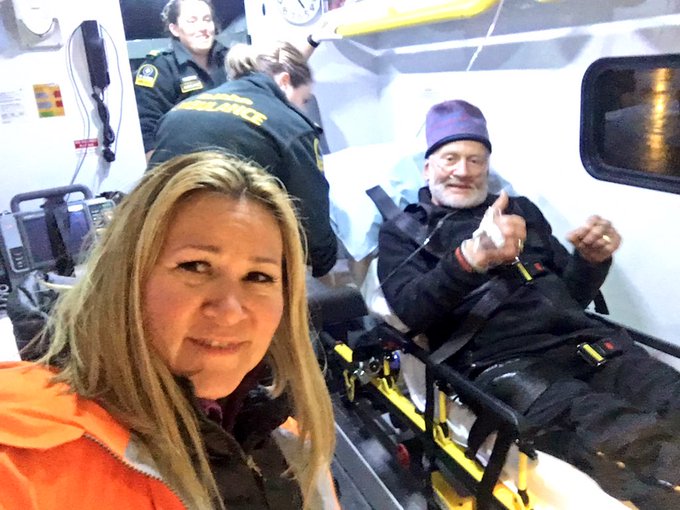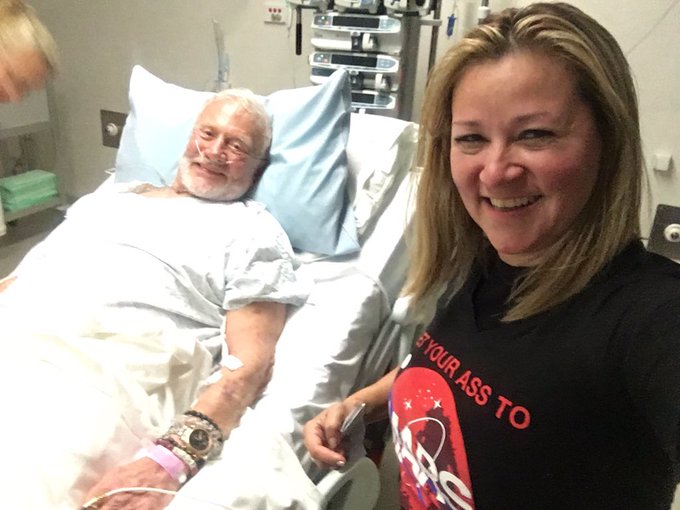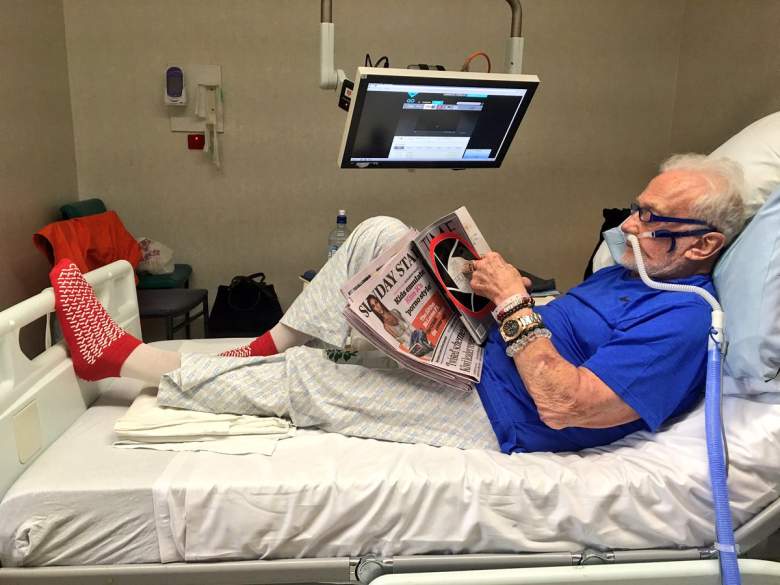
Buzz Aldrin on his hospital bed. “Catching up on the world while I’m stuck in quarantine. Apparently @KimKardashian is out in public again,” he wrote on Twitter. (Twitter/Buzz Aldrin)
Buzz Aldrin, the second man to walk on the moon, was evacuated from the South Pole on December 1 due to an illness. The 86-year-old Aldrin, who has never stopped going on adventures, was on a tourist trip to the South Pole with the group White Desert, which charges €64,000 or $68,051 per person. Aldrin left South Africa for the South Pole just two days ago.
Aldrin has been married three times, first to Joan Archer (1954-1974), then to Beverly Van Ziles (1975-1978). He was married to Lois Driggs Cannon from 1988 to 2011. He had three children with his first wife.
Aldrin, who currently advocates for manned missions to Mars, has been open about his health struggles in the past. Here’s a look at how the second human ever to step foot on the moon is doing these days.
1. Aldrin Was Rushed to a New Zealand Hospital & Still Has Congestion in his Lungs

Buzz Aldrin in South Africa, getting ready to board a plane to the Antarctic. (Instagram/Buzz Aldrin)
The National Science Foundation announced on December 1 that Aldrin was evacuated from the Amundsen-Scott South Pole Station to McMurdo Station, which is on the Antarctic Coast. He was then taken to New Zealand.
The NSF initially did not reveal any further details about Aldrin’s health. Doctors for White Desert and the U.S. Antarctic Program both decided that it would be best for Aldrin to leave Antarctica, White Desert said in a statement.
Here’s the full statement:
A White Desert client, Buzz Aldrin, has been evacuated from South Pole. Mr Aldrin was visiting the Pole as part of a tourist group and while there his condition deteriorated. As a precaution, following discussion between the White Desert doctor and the US Antarctic Program (USAP) doctor, Mr Aldrin, accompanied by a member of his team, was evacuated on the first available flight out of the South Pole to McMurdo with the USAP under the care of a USAP doctor. His condition was described as stable upon White Desert doctor’s hand-over to the USAP medial team.
The legendary astronaut was put on the first plane to McMurdo Station. His family was notified.
On December 3, the Aldrin team updated his website, noting that Aldrin is resting in a Christchurch, New Zealand hospital and “still has some congestion in his lungs so has been advised not to take the long flight home to the States and to rest in New Zealand while it clears up.”
Aldrin explained in a statement what happened and why he wanted to go to Antarctica in the first place.
I started to feel a bit short of breath so the staff decided to check my vitals. After some examination they noticed congestion in my lungs and that my oxygen levels were low which indicated symptoms of altitude sickness. This prompted them to get me out on the next flight to McMurdo and once I was at sea level I began to feel much better. I didn’t get as much time to spend with the scientists as I would have liked to discuss the research they’re doing in relation to Mars. My visit was cut short and I had to leave after a couple of hours. I really enjoyed my short time in Antarctica and seeing what life could be like on Mars.
2. Aldrin Battled Alcoholism & Has Been Sober for 36 Years
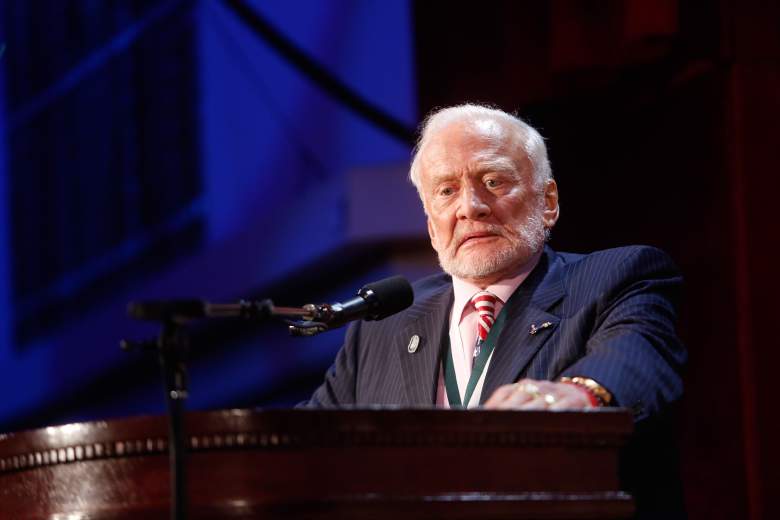
(Getty)
In a 2015 interview with AARP, Aldrin was candid about his own health struggles in the past. He says that he still sees a psychiatrist every few months and is an alcoholic. He’s been sober for 36 years.
“I’ve got 36 years of sobriety, but I still see a shrink every couple of weeks. When you’re depressed, you’re convinced it will never end. But when you’re on top of things, you’re convinced that will never end,” Aldrin said.
He also told AARP that he inherited depression, noting that both his grandfather and mother committed suicide. “I had my concerns with it after getting an assignment that I didn’t really want in the Air Force, after NASA. I experienced depression, alcoholism,” he said.
3. Aldrin Credits His Second Wife With Helping Him Get Sober in the Mid-1970s

(Getty)
In 2009, Aldrin published the book Magnificent Desolation: The Long Journey Home from the Moon with Ken Abraham. In it, he described why he turned to alcohol after he left NASA and the U.S. Air Force. He wrote:
…I had no more structure in my life. For the first time in more than forty years I had no one to tell me what to do, no one sending me on a mission, giving me challenging work assignments to be completed. Ironically, rather than feeling an exuberant sense of freedom, an elation that I was now free to explore on my own, I felt isolated, alone, and uncertain.
After his divorce from Joan, he began drinking more and more. At this time, he met his second wife, Beverly Van Ziles, an interior decorator. He credited her with helping him get sober. He wrote:
Beverly pleaded with me to stop drinking, to pour the booze down the drain, and to straighten up my apartment. When I ignored her, she did the dirty work for me, dumping the booze and cleaning the untidy mess in which I was wallowing. I appreciated her attempts to help me, but her words and actions only plunged me deeper into despair.
In late 1975, he spent nearly a month at Beverly Manor in Orange County, California.
4. Aldrin Thinks Mental Health of Astronauts Is ‘More Threatening Than Radiation’
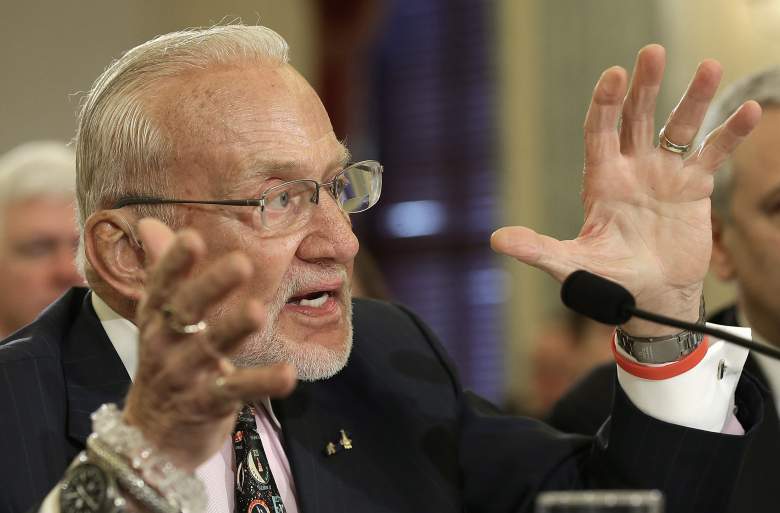
Buzz Aldrin testified before Congress on space exploration in February 2015. (Getty)
Earlier this year, Aldrin published another book, No Dream Is Too High: Life Lessons from a Man Who Walked on the Moon. In the book, he also touched on mental health and his battle with depression. He knows that there are others who have served their country as he has who might be battling addictions.
“There are lots of people dealing with addictions—more and more with pharmaceutical prescriptions, drugs and behind all of that is alcohol,” Aldrin told Parade in April. “And the recovery from addictions is aided immensely by helping another person. By knowing what your problems have been, and how you have worked to overcome them—because that’s exactly what that person wants to hear and wants to feel. I inherited depression. My grandfather committed suicide. My mother did before I went to the moon. And I have had those tendencies.”
He also thinks that NASA and other space agencies should be concerned about their crews’ mental health. “The mental health of crewmen is, I believe, far more significant—[more] threatening than radiation or changes in gravity fields,” he said.
5. Aldrin Now Works to Promote Manned Missions to Mars

(Getty)
In recent years, Aldrin has found a new cause to devote his time to: getting people excited about going to Mars. In 2015, he wrote Welcome To Mars, in which he and Marianne J. Dyson imagine how humans would live on the Red Planet. His Instagram page is covered with photos of him wearing a shirt that reads “Get your ass to Mars.” He was also in Australia in November to promote National Geographic’s MARS series.
“People who are 10 years old now will be the right age to go,” Aldrin told AARP. “They’re in the target audience of my new book, Welcome to Mars. In 15 years they’ll be old enough to start training. The life expectancy of those who choose to stay on Mars as permanent settlers might be reduced to what it would have been in 1900 or 1850.”
Aldrin is also working with the Florida Institute of Technology on a “master plan” for getting humans to Mars within 25 years.
